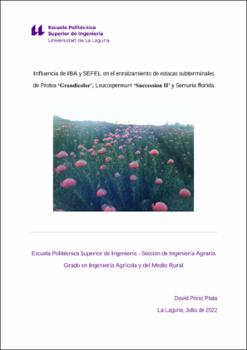Influencia de IBA y SEFEL en el enraizamiento de estacas subterminales de Protea "Grandicolor", Leucospermum "Succesion II" y Serruria florida.
Autor
Pérez Plata, DavidFecha
2022Resumen
Las Proteaceas son plantas de gran interés ornamental, cultivadas para flor cortada y follaje
principalmente. Consta de 80 géneros y unas 1.700 especies originarias de África del Sur y Australia.
Las especies más utilizadas se agrupan en los siguientes géneros de origen sudafricano; Proteas,
Leucospermum, Leucadendron y Serruria, así como en los australianos; Banksia y Telopea.
Este cultivo está cada vez más extendido por las Islas Canarias, siendo Tenerife y La Palma las
islas con más superficie cultivada. En los últimos años ambas islas, al igual que Gran Canaria, han
visto aumentada su superficie de cultivo, por lo cual el estudio de propagación de la planta es
totalmente necesario.
Debido al uso que se está haciendo en los últimos años de la aplicación de diferentes tipos de
enraizantes químicos y orgánicos como IBA y SEFEL (Sistema de Elaboración de Fertilizantes
Ecológicos Líquidos), se decidió realizar este ensayo para estudiar la influencia de los mismos, así
como, comparar cuál de ellos muestra un mayor potencial de enraizamiento bajo las mismas
condiciones ambientales y el mismo medio de enraizamiento.
El ensayo estudia el comportamiento al enraizamiento de estacas subapicales, con lesionado o
sin él, de los cultivares Protea ‘Grandicolor’, Leucospermum ‘Succession II’ y la especie Serruria
florida, aplicando IBA y SEFEL y mezclas de ambos enraizantes.
El diseño experimental se realizó en bloques al azar con 9 tratamientos y 3 repeticiones con 12
estacas por tratamiento, para Protea ‘Grandicolor’ y Leucospermum ‘Succession II’. Por otro lado,
para el cultivar Serruria florida se aplicaron 11 tratamientos, con 3 repeticiones para cada uno y 12
estacas por tratamiento. Las estacas tenían entre 70 y 80 cm de largo, y las subapicales unos 15 cm. El
lesionado se le aplicó a la mitad de las muestras y se realizaron 3 ensayos, uno por cultivar, con las
estacas subapicales y combinando SEFEL e IBA en diferentes dosis.
Se realizaron conteos cada 3 semanas contabilizándose las estacas muertas, sin callo, con callo
y con raíces trasplantables. Los datos obtenidos se sometieron a un análisis de varianza y a la
separación de medias por el Test de Duncan, para determinar cuál de los tratamientos aplicados
ofrecía mejor comportamiento al enraizamiento en los diferentes cultivares y especie ensayados. Se
realizó un estudio estadístico sobre el índice de enraizamiento.
De los resultados obtenidos se deduce que para P. ‘Grandicolor’ el tratamiento 4.000 ppm IBA
con lesionado y sin lesionado fue el que obtuvo los mejores porcentajes de estacas raíces
trasplantables; para Leucospermum ‘Succession II’ fue el tratamiento SEFEL, con lesionado y para
Serruria florida el tratamiento SEFEL + 4.000 ppm de IBA, con lesionado. The Proteaceas are plants of great ornamental interest, cultivated mainly for cut flowers and
foliage. It consists of 80 genera and about 1,700 species originating from South Africa and Australia.
The most used species are grouped into the following genera of South African origin; Proteas,
Leucospermum, Leucadendron and Serruria, as well as in Australians; Banksia and Telopea.
This crop is increasingly widespread in the Canary Islands, with Tenerife and La Palma being
the islands with the largest cultivated area. In recent years, both islands, like Gran Canaria, have seen
their cultivation area increase, which is why a study of the propagation of the plant is absolutely
necessary.
Due to the use that is being made in recent years of the application of different types of
chemical and organic rooting agents such as IBA and SEFEL (System for the Preparation of Liquid
Ecological Fertilizers), it was decided to carry out this trial to study their influence, as well as as,
compare which of them shows a higher rooting potential under the same environmental conditions
and the same rooting medium.
The essay studies the rooting behavior of subapical cuttings, with or without injury, of the
cultivars Protea 'Grandicolor', Leucospermum 'Succession II' and the species Serruria florida,
applying IBA and SEFEL and mixtures of both rooting agents.
The experimental design was carried out in randomized blocks with 9 treatments and 3
repetitions with 12 cuttings per treatment, for Protea 'Grandicolor' and Leucospermum 'Succession II'.
On the other hand, for the cultivar Serruria florida, 11 treatments were applied, with 3 repetitions for
each one and 12 cuttings per treatment. The cuttings were between 70 and 80 cm long, and the
subapical about 15 cm. The lesion was applied to half of the samples and 3 trials were carried out, one
per cultivar, with subapical cuttings and combining SEFEL and IBA at different doses.
Counts were made every 3 weeks, counting dead cuttings, without callus, with callus and with
transplantable roots. The data obtained were subjected to an analysis of variance and the separation of
means by Duncan's Test, to determine which of the applied treatments offered the best rooting
behavior in the different cultivars and species tested. A statistical study was carried out on the rooting
index.
From the results obtained, it can be deduced that for P. 'Grandicolor', the 4,000 ppm IBA
treatment with lesions and without lesions was the one that obtained the best percentages of
transplantable root cuttings; for Leucospermum 'Succession II' it was the SEFEL treatment, with
lesions, and for Serruria florida, the SEFEL + 4,000 ppm IBA treatment, with lesions





